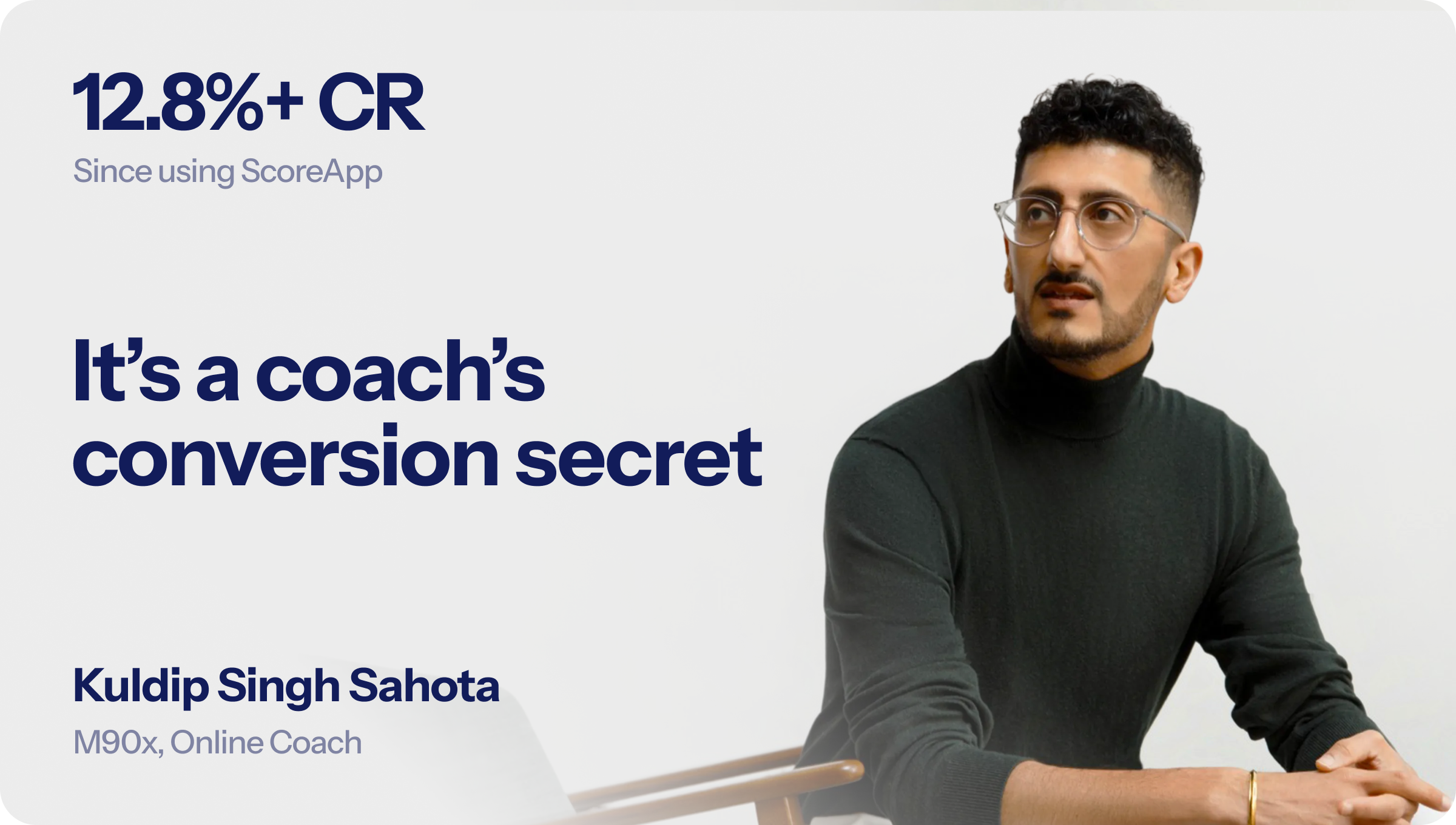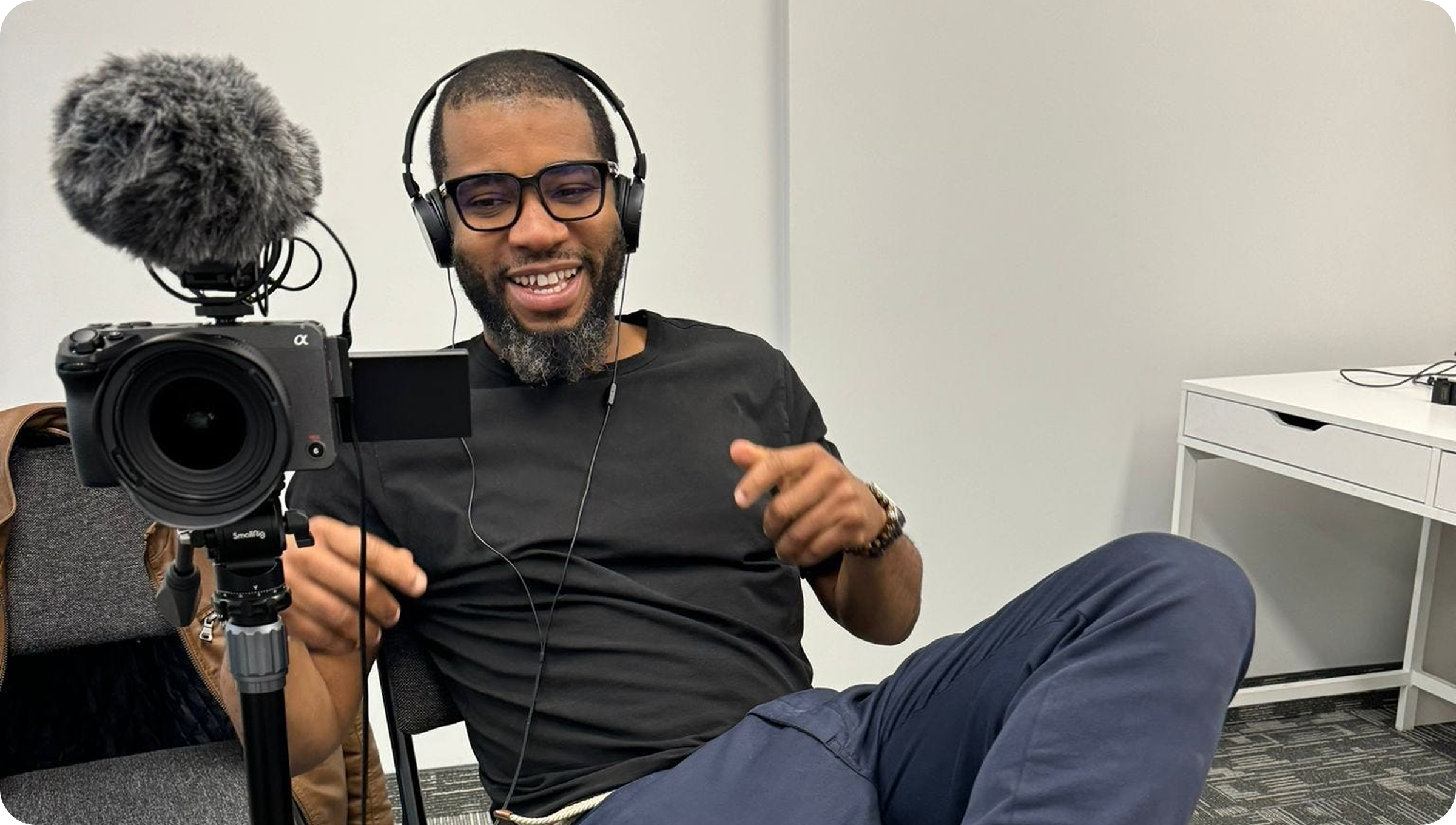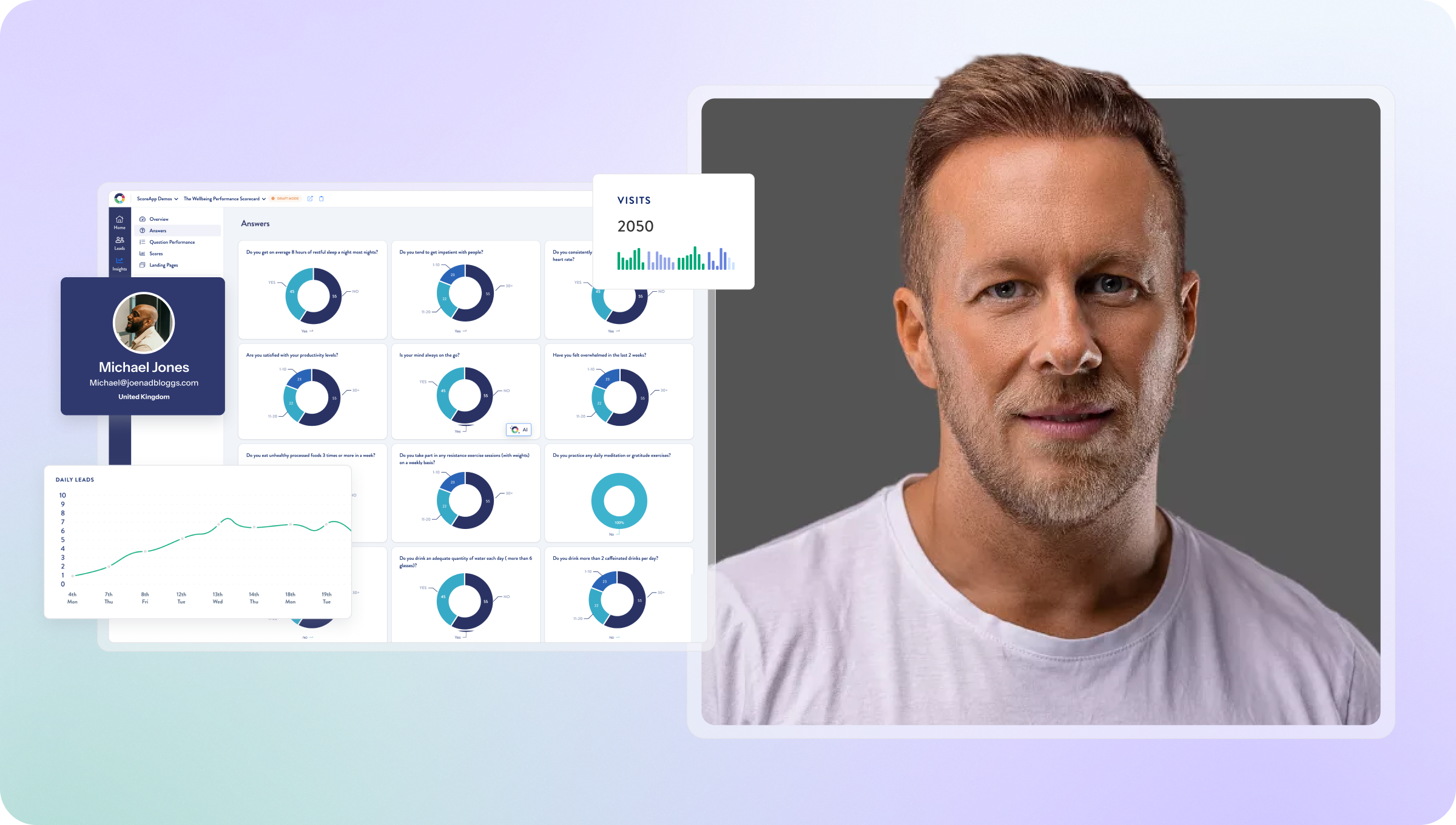Dr. Robert Cialdini’s Influence: How to Turn More Leads into Sales


Let’s face it, we all want our marketing to be more persuasive, without sounding ‘salesy’ or pushy. But, what’s the best way to approach it?
Dr. Robert Cialdini’s book, Influence: The Psychology of Persuasion—first published in 1984 and updated in 2021—has been a trusted read for marketers, entrepreneurs, and business owners for decades.
Supported by experience in psychology, the book explains why people say “yes” – and how to win trust, build authority, and convert more leads.
In this article, we’re going to take a close look at Cialdini’s seven principles of persuasion and walk you through exactly how ScoreApp’s quizzes and segmentation tools can help you use them to grow your business.
Let’s get started.
1. Reciprocity

So, what exactly is reciprocity, and how can it help you grow your business?
Reciprocity is a simple but powerful psychological tool: if you give something of value, people will naturally want to give back to you.
A renowned academic, Dr. Cialdini, tells us it’s everywhere in business. From free samples in shops to downloadable guides in a marketing funnel, reciprocity is used to create goodwill and spark potential customers to take that next step.
How to apply it with ScoreApp
ScoreApp is built around this principle, too. Every quiz or assessment is designed to give your audience something in return: insight, clarity, and a result they can act on.
Here’s how it works in practice…
- You create a quiz like: ‘What’s Your Marketing Strength?’
- You deliver a personalized result: People get instant value, without having to book a call or read a PDF.
- You use the momentum: Follow up with personalised emails offering more value – something like a checklist, an invite, or an offer.
By providing something helpful through your quiz, you’re not just casting a wide net and hoping for the best. You’re creating a fledgling relationship based on value and making conversion more natural.
2. Consistency
Cialdini says that once people have made a decision or a stand for something, they’re more likely to keep acting in a way that keeps them aligned with that decision.
This is the principle of consistency, and it’s one of the most important ways to convert your leads into customers.
By getting someone to say “yes”, even in a small way (like taking a quiz), they’re likely to say “yes” again later – by subscribing, attending a webinar, or becoming a customer.
How to apply it with ScoreApp
Every step in a ScoreApp quiz is a “yes” that moves your audience along a path towards conversion.
Here’s how to put this kind of consistency into action…
- Start with simple, low-friction questions: Ask questions that are easy to answer and don’t require a lot of thought. This warms people up.
- Make the result feel personal: When people receive personalised insights, they feel understood, making them more likely to keep engaging with you.
- Include a clear next step: After taking the quiz, prompt users to book a call, watch a webinar, or download a resource. Little, incremental ‘asks’ will feel natural and align with their behavior so far.
- Use automation to follow up: Integrate ScoreApp with your email marketing platform or CRM and send emails based on quiz results to offer a next step. This keeps momentum going and builds long-term trust.
By using ScoreApp to guide your potential customers through small, consistent actions, you’ll be building momentum that will naturally lead to conversion.
3. Social proof

When people don’t know what to do, they look to other people. That’s the psychology behind social proof, and it’s a very effective way to build trust and increase conversions.
Whether you publish reviews, testimonials, or just show how many people have signed up for your product or service, you reduce concerns. If people lead, others will follow.
How to apply it with ScoreApp
ScoreApp makes it simple to build social proof into your lead generation.
Here’s how…
- Show quiz data: Let people know how many other people have completed your quiz.
- Add testimonials: Ask for and include any short quotes from participants who found value in your results.
- Encourage sharing: Prompt prospects to share their score on social media. This will extend your reach and increase your credibility.
ScoreApp is an ingenious software tool that gives you reciprocal relationships, so build social proof into your marketing and turn your existing audience into a marketing asset.
4. Authority
As human beings, we’re wired to trust people who look and sound like experts. Think about doctors in white coats or bestselling authors giving TED talks.
That’s why authority is on Dr. Cialdini’s list of persuasion principles – especially in industries where trust is particularly important to customers.
If your audience sees you as a trusted expert, they’re far more likely to listen to you, take you up on your lead magnet, and buy your product.
How to apply it with ScoreApp
ScoreApp helps you establish authority as you generate leads.
Here’s what to do…
- Design assessments that teach something valuable: Use a quiz to educate and deliver ‘a-ha’ moments to build credibility.
- Use branded, professional-looking quiz designs: ScoreApp’s growing library of customizable templates will help you look polished and trustworthy.
- Deliver personalized insights: Provide specific, actionable results, so people want to hear more from you.
- Follow up with expert advice: Use ScoreApp’s integrations for email marketing tools like ActiveCampaign and Mailchimp, and send follow-up emails with tips and recommendations.
Why not think of your ScoreApp quiz as a ‘mini-consultation’? You can use it to build trust, credibility, and follow up to position yourself as an expert in your industry.
5. Liking

We’re far more likely to say yes to people we like. That’s obvious, right? But Robert Cialdini’s research shows just how powerful this principle really is. From shared interests to building friendly communication, liking builds trust, and trust builds sales.
People want to do business with people they like. And we like people who are:
- Friendly and approachable
- Similar to us in some way
- Complimentary or encouraging
- Helpful without being pushy
This means your tone, your content, and the look and feel of your lead magnet have a huge impact on your conversions.
How to apply it with ScoreApp
With a ScoreApp quiz, you can create a personalized journey to make your audience feel seen and understood.
Here’s how to do it…
- Use a conversational tone: Write like you’re talking to a friend. Keep it clear and use plenty of empathy.
- Personalize the quiz experience: Tailor questions and feedback to reflect your audience’s challenges and goals. Make them feel like your quiz is just for them!
- Add a friendly face: Use your photo and name on the results page, or add a welcome video to make the experience more human.
- Follow up with personality: Continue the same voice and tone in your follow-up emails. Show up, and be helpful, engaging, and consistent.
Liking is a powerful conversion strategy, and ScoreApp can help you build a relationship as soon as your prospect engages with your quiz online.
6. Scarcity
When was the last time you felt FOMO (Fear Of Missing Out)? As humans, it’s in our nature – people don’t want to miss out.
Cialdini’s principle of scarcity explains that we act when something feels limited, whether that’s time or availability.
Think about it:
- When a quiz is only available for a limited time, people will be more likely to take it quickly.
- When access to a resource or consultation is exclusive, all of a sudden, it feels more valuable.
How to apply this in ScoreApp
You can use ScoreApp quizzes as time-sensitive lead magnets. For example, one way to do this would be to give access to gated content that’s only available to subscribers who complete an assessment within a set time period.
Here are a few other ideas of how to use scarcity…
- Include a deadline in your quiz description or email follow-up: e.g., “Only available until Friday!”.
- Offer limited follow-up spots for high scorers: e.g., “Only 5 spaces left this month for a free strategy session!”.
- Create result-based scarcity: e.g., “If you scored 80+ you’re eligible for early access!”.
Scarcity prompts people to take action now, rather than putting it off. With ScoreApp, you have a way to make this process simple and scalable.
7. Unity

In the 2021 edition of Influence, Dr. Cialdini introduced a seventh principle to his original six—unity. This principle isn’t just about liking, but belonging.
It’s based on the idea that we’re more easily persuaded by people who feel like us. Traditionally, this would have been our tribe, now it’s our community.
When your audience sees themselves reflected in your brand or values and feels part of your community, they’re far more likely to engage, take action, and stay loyal.
How to apply this with ScoreApp
Here’s how to build a sense of unity through your ScoreApp quizzes…
- Use inclusive language and imagery: Make sure your quiz feels welcoming and relatable.
- Reflect shared values: Use quiz questions to show you understand their goals and challenges.
- Create tailored pathways: Based on their quiz results, guide audience segments to content that speaks directly to their needs and their identity.
Unite your leads through a common goal, profession, or experience and build a community. When people feel they belong, they’re far more likely to say yes.
Putting Cialdini’s principles into practice with ScoreApp

Robert Cialdini’s principles of influence are powerful psychological triggers. They’re easily understood, and everyone can use them to build a better business through more leads and sales.
Let’s have a quick recap of how ScoreApp makes it easy:
- Reciprocity: Quizzes and assessments deliver personalized insights in exchange for email addresses.
- Commitment and consistency: You can encourage small commitments through fun, low-barrier quiz interactions, leading naturally to deeper engagement.
- Social proof: It’s easy to showcase data, testimonials, and success stories through quiz results and follow-up emails that build trust and credibility.
- Authority: You can use well-crafted quiz content to position yourself as an expert and give tailored advice based on user answers.
- Liking: By creating branded, conversational quizzes that reflect your tone and values, you can connect with your audience on a personal level.
- Scarcity: Through time-sensitive offers, gated content, and exclusive follow-ups.
- Unity: You can create a sense of belonging with tailored quiz experiences that reflect your audience’s identity, values, and shared goals.
Using ScoreApp, you can implement Cialdini’s principles and gather better leads. More trust. Higher conversions. And create an experience your audience enjoys.
Ready to convert more leads with psychology that works? Start your FREE ScoreApp trial today!



